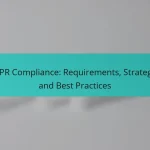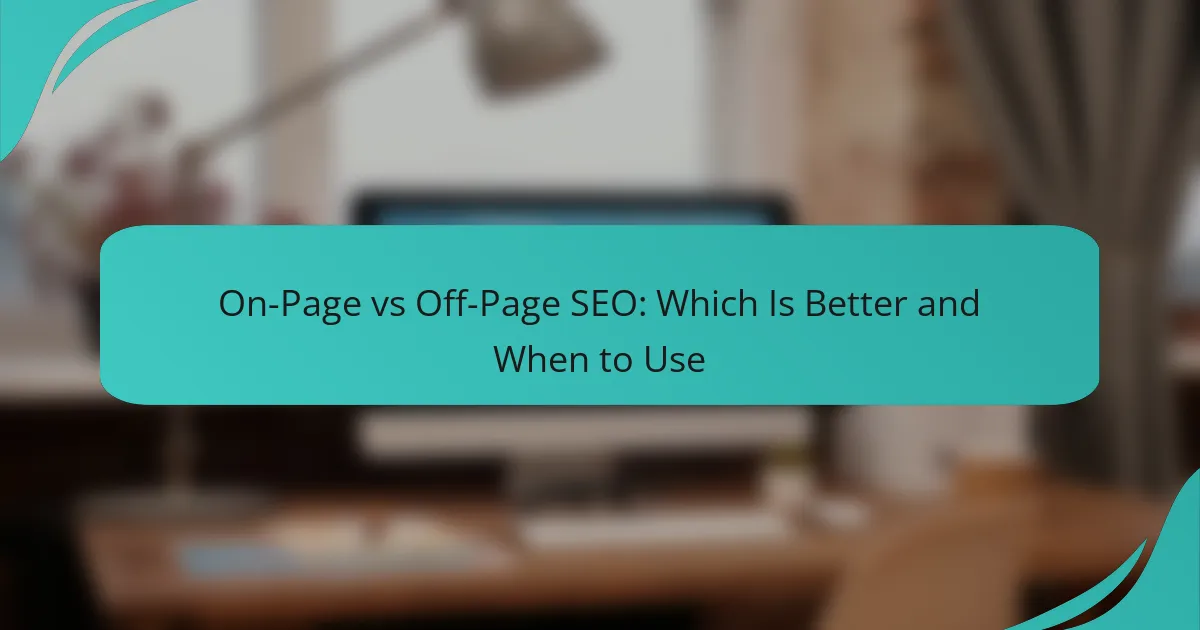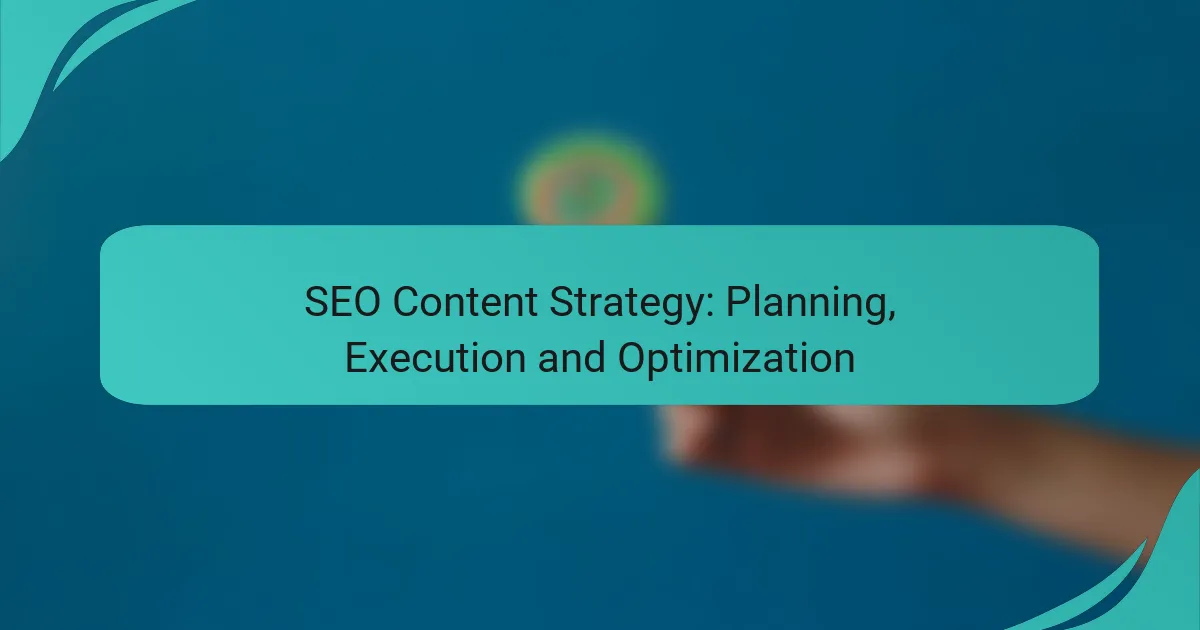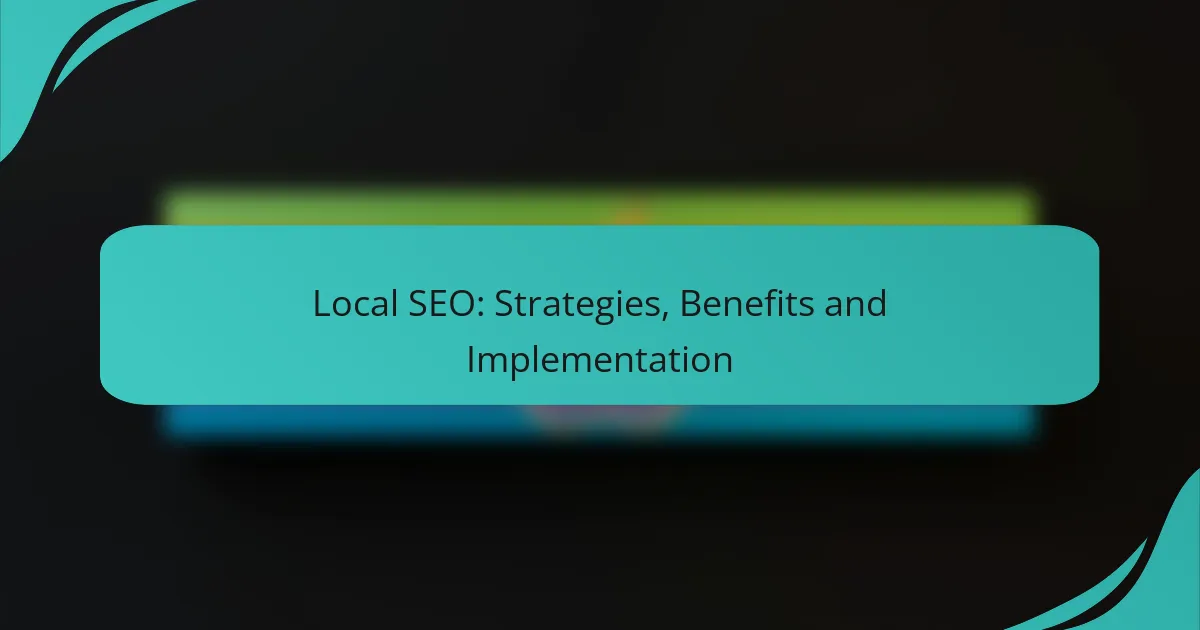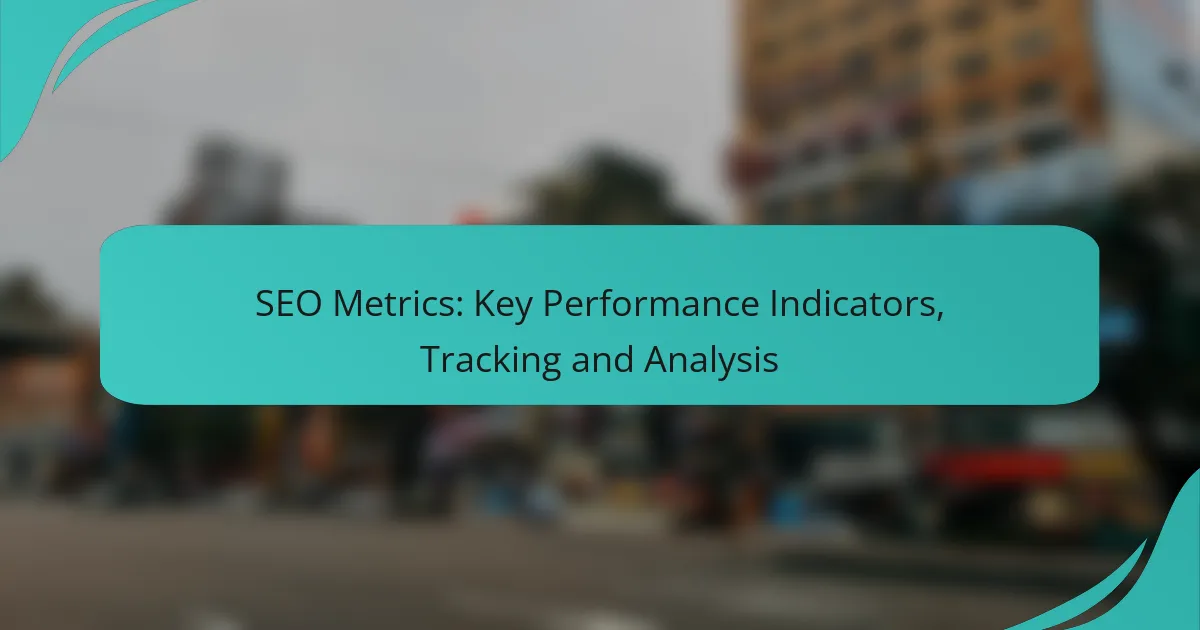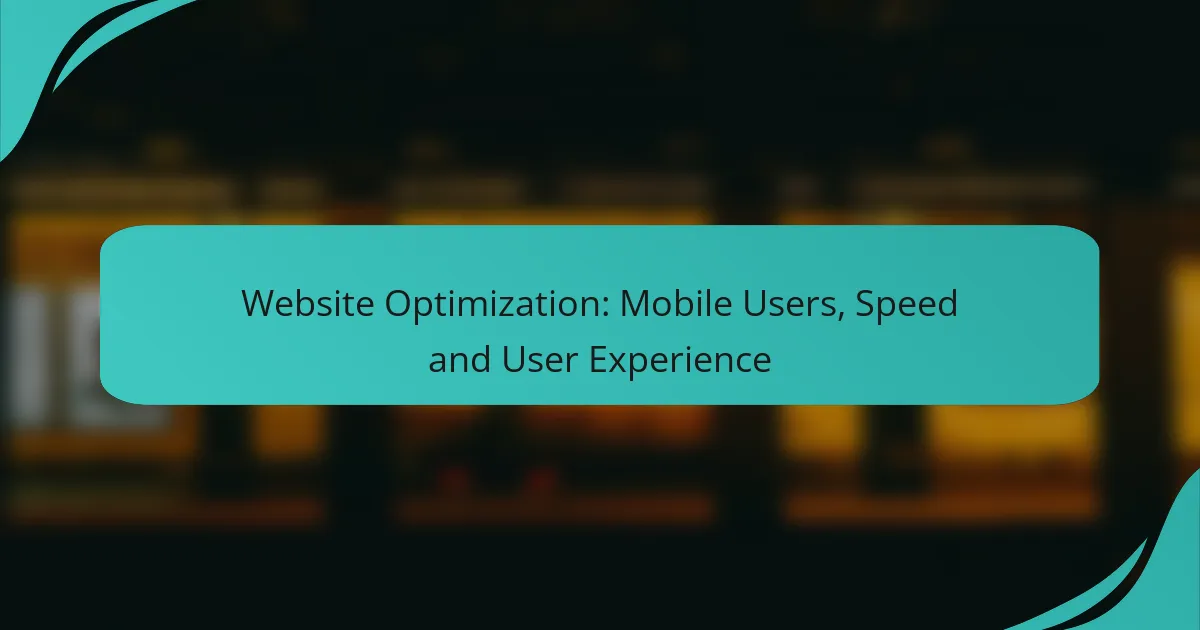Understanding the distinction between On-Page and Off-Page SEO is crucial for effective digital marketing. On-Page SEO focuses on optimizing individual web pages through elements like content quality and keyword usage, while Off-Page SEO involves external strategies such as backlink building and social media engagement. Knowing when to apply each technique can significantly enhance your website’s visibility and authority in search engine results.
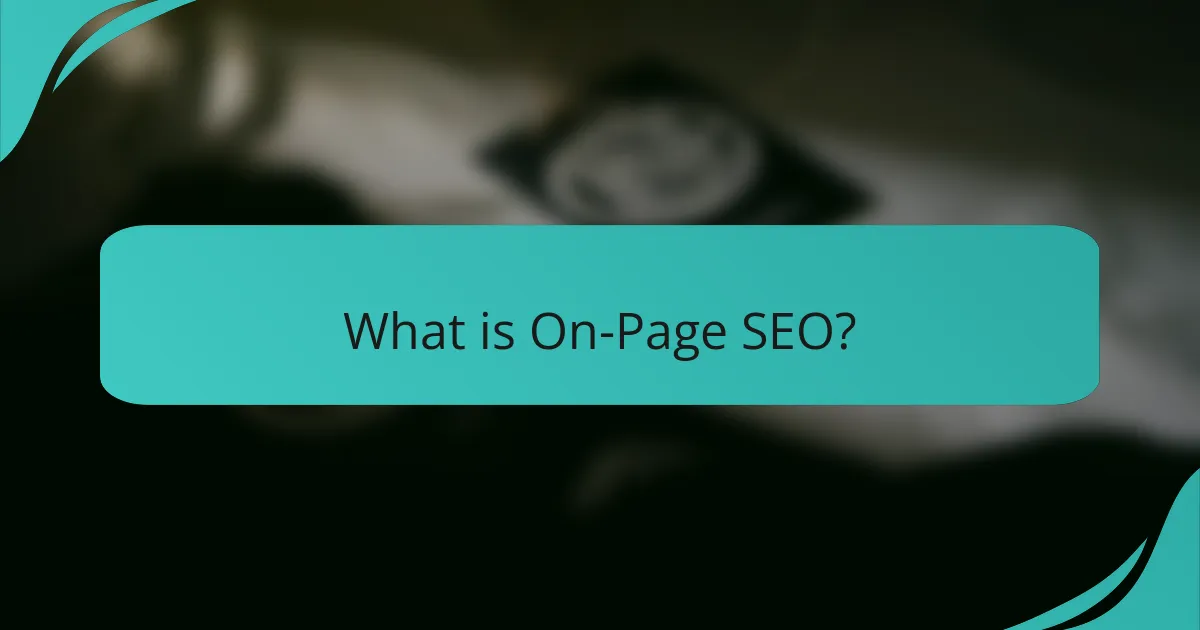
What is On-Page SEO?
On-Page SEO refers to the practice of optimizing individual web pages to improve their search engine rankings and attract relevant traffic. This involves various elements on the page itself, such as content quality, keyword usage, and HTML tags.
Definition and key elements
On-Page SEO encompasses all the strategies used directly on a website to enhance its visibility in search engines. Key elements include title tags, meta descriptions, header tags, and internal linking, all of which help search engines understand the content and context of a page.
Additionally, optimizing images, ensuring mobile-friendliness, and improving page load speed are crucial components. These factors contribute to a better user experience, which is increasingly important for search rankings.
Importance for website ranking
On-Page SEO plays a vital role in determining a website’s ranking on search engines. Well-optimized pages are more likely to be indexed and ranked higher, leading to increased visibility and organic traffic.
Search engines prioritize content that is relevant and well-structured, making On-Page SEO essential for competing effectively in search results. Without proper optimization, even high-quality content may struggle to reach its target audience.
Examples of On-Page techniques
Common On-Page SEO techniques include using relevant keywords in titles and headers, writing compelling meta descriptions, and creating high-quality, informative content. For instance, incorporating keywords naturally within the first 100 words of a page can enhance relevance.
Other techniques involve optimizing images with descriptive alt text, using bullet points for readability, and ensuring that URLs are concise and keyword-rich. Regularly updating content and using internal links to connect related pages can also improve SEO performance.
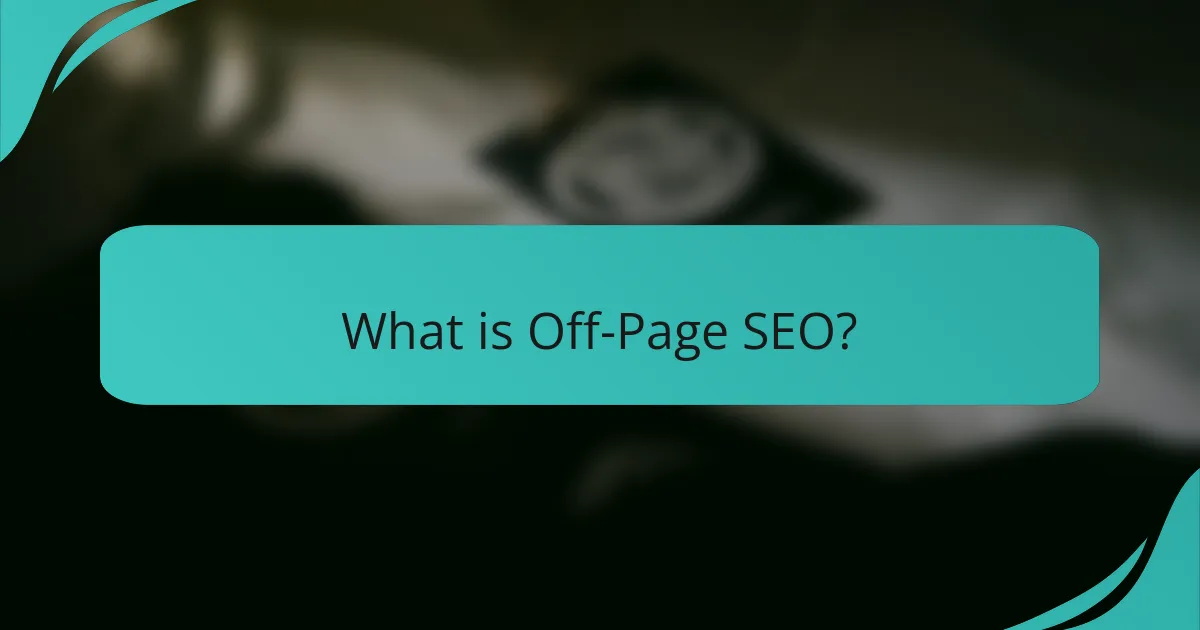
What is Off-Page SEO?
Off-page SEO refers to the strategies and actions taken outside of your own website to impact its ranking in search engine results. This includes building backlinks, social media engagement, and brand mentions, all of which contribute to a site’s authority and relevance.
Definition and key elements
Off-page SEO encompasses various techniques that enhance a website’s visibility and credibility through external factors. Key elements include link building, social media marketing, influencer outreach, and online reputation management. Each of these elements plays a crucial role in how search engines perceive the site’s authority.
Importance for website authority
Off-page SEO is vital for establishing a website’s authority, as search engines like Google use external signals to gauge trustworthiness. A strong off-page strategy can lead to higher rankings, increased organic traffic, and improved brand recognition. Websites with numerous high-quality backlinks and active social media presence tend to rank better than those relying solely on on-page SEO.
Examples of Off-Page techniques
Common off-page SEO techniques include guest blogging, where you write articles for other sites to gain backlinks, and social media sharing, which helps increase visibility and engagement. Additionally, participating in online forums and communities can enhance your brand presence and generate valuable links. Other methods include influencer collaborations and press releases to reach wider audiences.
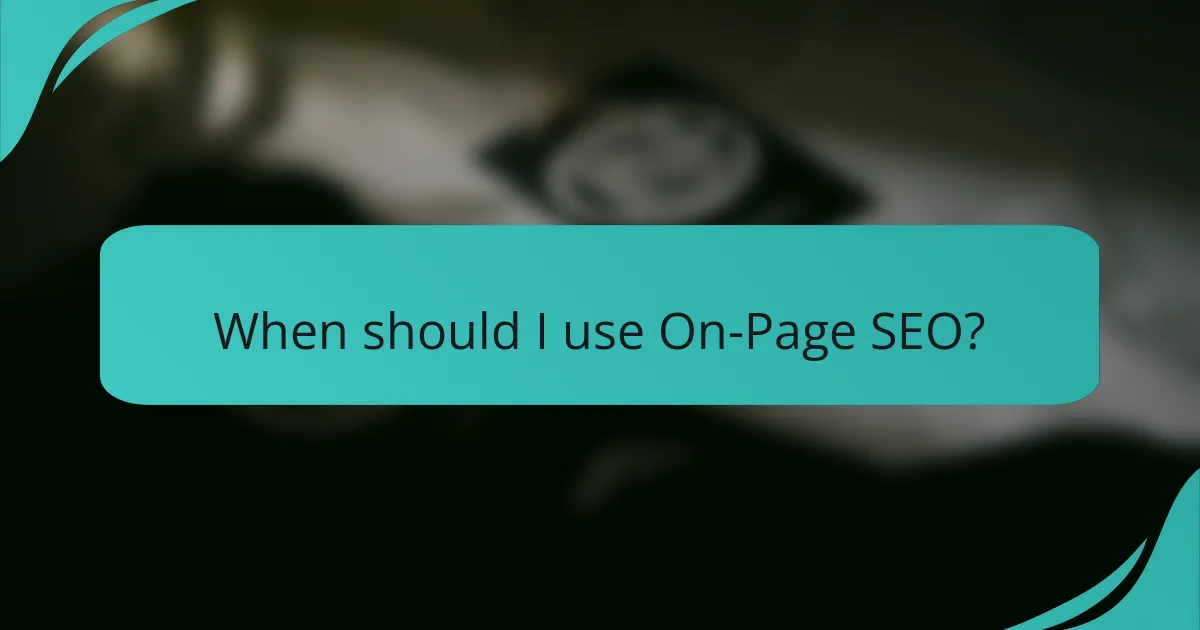
When should I use On-Page SEO?
On-Page SEO should be used whenever you want to optimize individual web pages to improve their ranking in search engines and attract more relevant traffic. This technique focuses on elements within your control, such as content quality, keyword usage, and HTML tags.
Best scenarios for implementation
On-Page SEO is particularly effective when launching a new website or updating existing content. For example, if you’re creating a blog post, implementing On-Page SEO can help it rank higher for targeted keywords. It’s also beneficial during website redesigns to ensure that all pages are optimized for search engines.
Consider using On-Page SEO when targeting specific local markets. Tailoring your content to include local keywords can significantly enhance visibility in search results relevant to your area.
Impact on user experience
Effective On-Page SEO directly enhances user experience by making content more accessible and engaging. Well-structured headings, clear navigation, and optimized images can lead to lower bounce rates and longer time spent on the site.
Additionally, incorporating relevant keywords naturally into your content helps users find what they are looking for quickly. This alignment between user intent and content can foster trust and encourage repeat visits, ultimately benefiting your site’s performance in search rankings.
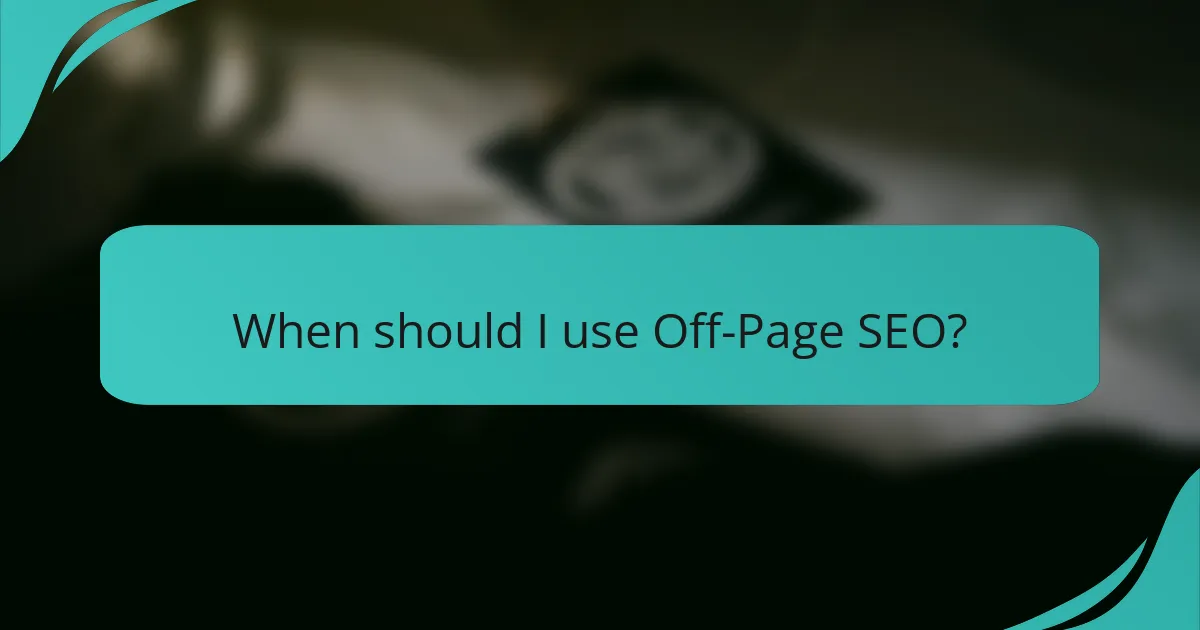
When should I use Off-Page SEO?
Off-page SEO should be used when you want to enhance your site’s authority and visibility through external factors. This includes activities like link building, social media engagement, and influencer collaborations that can drive traffic and improve search rankings.
Best scenarios for implementation
Off-page SEO is particularly effective when launching a new website, as it helps establish credibility and attract initial visitors. It is also beneficial during product launches or promotional campaigns, where increased visibility can lead to higher sales and brand awareness.
Consider implementing off-page strategies when facing strong competition in your niche. Building backlinks from reputable sites can help you stand out and improve your ranking in search results.
Impact on brand reputation
Off-page SEO significantly influences brand reputation by shaping how your audience perceives your business. Quality backlinks from authoritative sources can enhance trust and credibility, while negative mentions on social media can harm your image.
Engaging with customers through social media and responding to reviews can further bolster your brand’s reputation. Positive interactions can lead to increased loyalty and word-of-mouth referrals, which are crucial for long-term success.
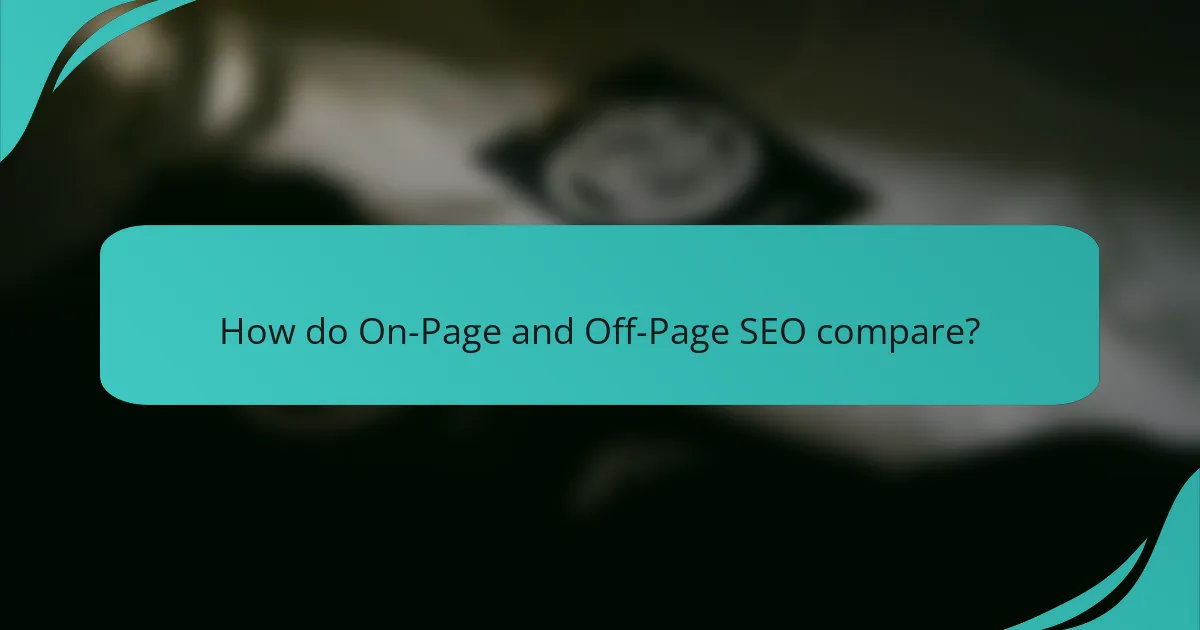
How do On-Page and Off-Page SEO compare?
On-Page SEO focuses on optimizing elements within your own website, while Off-Page SEO involves strategies that occur outside your site to improve its authority and ranking. Both are essential for a comprehensive SEO strategy, but they serve different purposes and should be used in conjunction.
Key differences
On-Page SEO includes practices such as optimizing content, improving site structure, and enhancing user experience. This can involve keyword placement, meta tags, and internal linking. In contrast, Off-Page SEO primarily revolves around building backlinks, social media engagement, and brand mentions across the web.
While On-Page SEO can lead to immediate improvements in search rankings, Off-Page SEO often requires more time to build credibility and authority. For example, a well-optimized page can rank higher quickly, but gaining quality backlinks may take weeks or months.
Complementary strategies
To maximize SEO effectiveness, integrate On-Page and Off-Page strategies. Start with a solid On-Page foundation by ensuring your website is user-friendly and content-rich. Then, focus on Off-Page tactics like outreach for backlinks and engaging with your audience on social media.
A common pitfall is neglecting either aspect. For instance, a site may have excellent content but lack backlinks, limiting its visibility. Conversely, a site with many backlinks but poor content may struggle to retain visitors. Aim for balance; both elements enhance each other and contribute to long-term success.
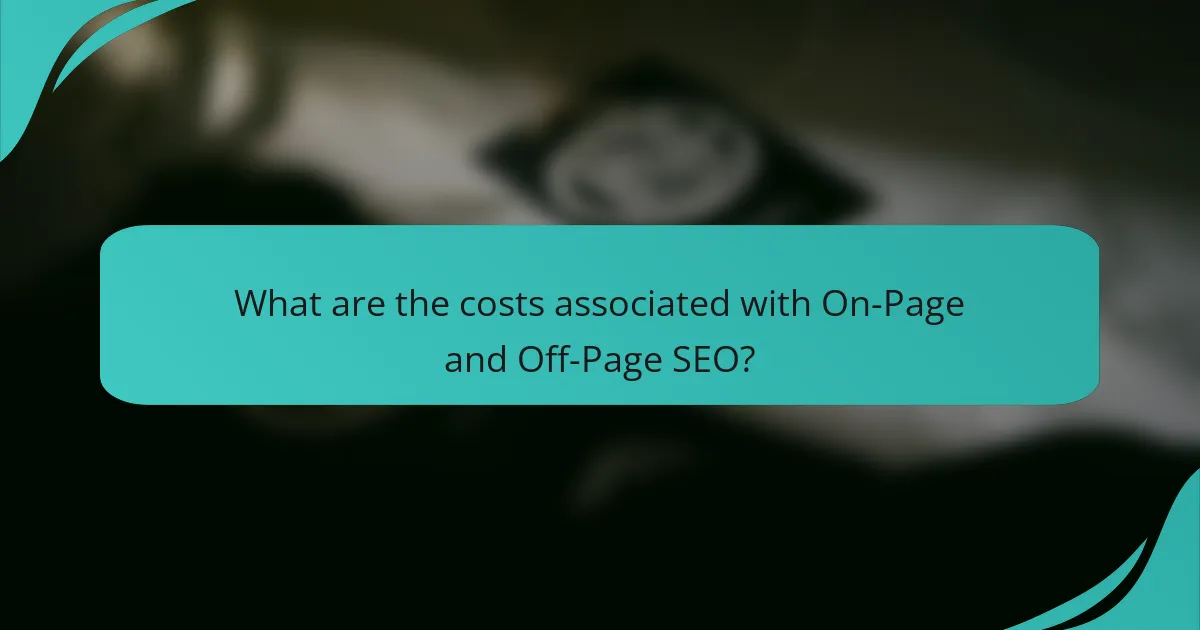
What are the costs associated with On-Page and Off-Page SEO?
The costs of On-Page and Off-Page SEO can vary significantly based on the strategies employed and the service providers chosen. On-Page SEO typically involves optimizing website content and structure, while Off-Page SEO focuses on building authority through external links and social signals.
Typical pricing for services
On-Page SEO services usually range from a few hundred to several thousand USD, depending on the complexity of the website and the depth of optimization required. Basic packages may start around $300, while comprehensive audits and implementations can exceed $2,000.
Off-Page SEO costs can be more variable, often influenced by the quality and number of backlinks needed. Monthly retainers for link-building services can range from $500 to over $5,000, depending on the provider’s reputation and the competitiveness of the industry.
Cost-effectiveness analysis
When evaluating cost-effectiveness, consider the potential return on investment (ROI) from each strategy. On-Page SEO can yield quicker results in terms of improved rankings and traffic, making it a cost-effective choice for immediate needs.
In contrast, Off-Page SEO may require a longer-term commitment before seeing significant benefits, but it can lead to sustained traffic and authority over time. Balancing both strategies is often the best approach, as they complement each other in enhancing overall SEO performance.
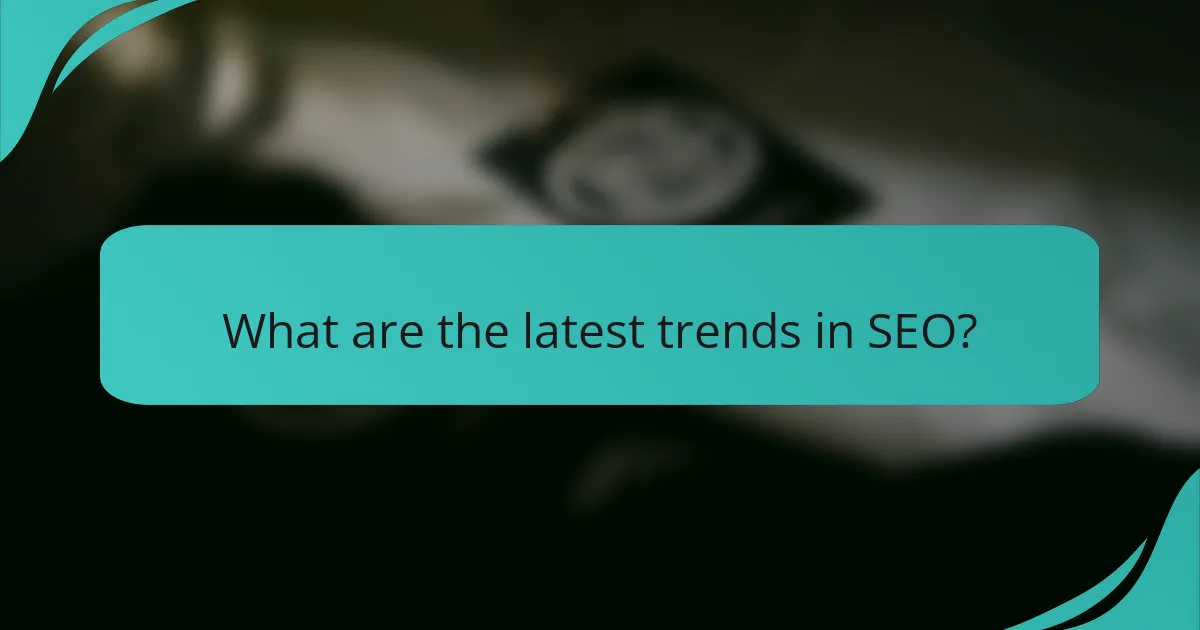
What are the latest trends in SEO?
The latest trends in SEO focus on user experience, content quality, and the integration of artificial intelligence. As search engines evolve, optimizing for voice search, mobile responsiveness, and semantic search has become increasingly important.
Emerging techniques
Emerging techniques in SEO include the use of AI-driven tools for content creation and optimization. These tools analyze user behavior and preferences to tailor content that resonates with target audiences. Additionally, video content is gaining traction, with platforms like YouTube becoming essential for driving traffic.
Another technique is the implementation of structured data, which helps search engines understand content context better. This can lead to enhanced visibility through rich snippets in search results, improving click-through rates.
Future of SEO strategies
The future of SEO strategies will likely revolve around personalization and advanced analytics. As search engines prioritize user intent, businesses must focus on delivering tailored content that meets specific needs. This involves leveraging data analytics to refine targeting and improve engagement.
Furthermore, voice search optimization will become crucial as smart speakers and voice assistants gain popularity. Marketers should adopt a conversational tone in their content and focus on long-tail keywords that align with natural speech patterns.





